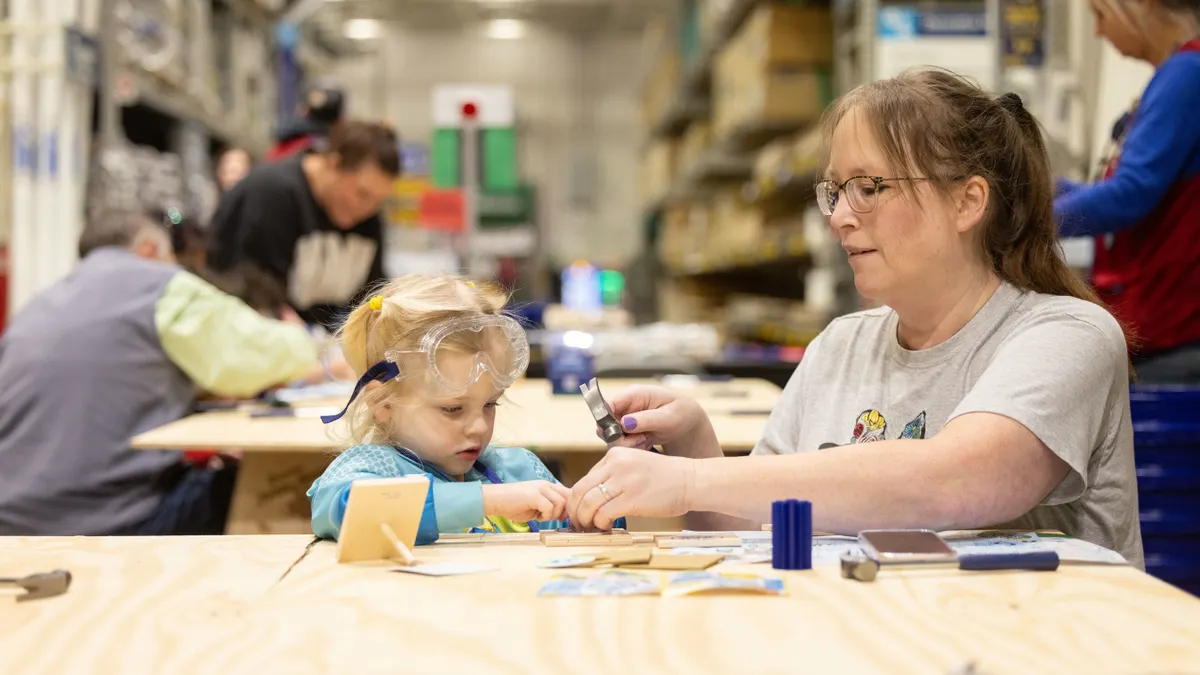The following article is part of the "30 minutes" series, where Retail Dive talks to top executives about some of retail's hottest topics. For more, check out our landing page.

Kaity Cimo
Co-founder of For NowTenure
2017-Present
Experience
Cimo co-founded For Now in 2017. Prior to this, she was the director of marketing at activewear startup Crane & Lion from 2013 to 2017.

Katharine ReQua
Co-founder of For NowTenure
2017-Present
Experience
ReQua co-founded For Now in 2017 and serves as the company's director of operations. She's held a number of operations-related roles, including the director of operations at Crane & Lion.
Kaity Cimo and Katharine ReQua started For Now, a regional brand incubator, with one goal in mind: to help brands grow.
The company, which has two retail storefronts in Boston's Seaport district and Nantucket, will typically work with around 20 emerging brands for three to four months at a time. Brands are given access to physical retail through For Now's stores, receive product feedback from customers and exposure to a new set of customers.
Cimo and ReQua believe that in order for brands to be successful, they need to have strong operational and marketing foundations. That's where their prior experience comes into play.
Before launching For Now, the founders were working together at a women's activewear company where Cimo was the director of marketing and ReQua was the director of operations.
"We found that ops and marketing just sit at the same table, not only literally but figuratively," ReQua said. "So many of the decisions that we were making really drove the success of that business, and we wanted to take our skill set and our expertise and help other brands grow."
From a brand's standpoint, particularly a digitally native one, partnering with For Now allows customers to touch and feel a product before making a purchase while at the same time creating greater potential to acquire customers in different markets. Over the years, as the limitations of exclusively selling goods online have become ever more apparent, direct-to-consumer brands have entered brick and mortar through a variety of ways, whether through stand-alone stores, temporary pop-up shops or partnerships with traditional retailers, like Target and Walmart.
And while opening a storefront wasn't part of For Now's initial strategy, it's really become a part of its overall mission.
"We really believe in the physical storefront, and not all brands can do it on their own. It's extremely capitally and human-capitally intensive," ReQua said. "So, if you can find a partner who can tell your story on your behalf, generate sales on your behalf and collect feedback on your behalf, it's a win-win."
The small-shop atmosphere may play to brands' advantage as well. Brands not only reach a new audience but through For Now, they also gain direct feedback and customer insights from shoppers, so they're able to take those learnings and make necessary adjustments as they grow.
"Exposure is really, really important," ReQua said. "We're telling that story in a way that sometimes the founder can't always articulate, and I think some brands struggle with their true value prop. By seeing that product with customers, and often hearing the same thing over and over again, we're able to take that back to the brands and be like, 'Have you ever thought about positioning it this way? Or packaging it that way? Because that's how customers are seeing it.' So it really is a holistic view."
Building these relationships and gaining insights by communicating directly with customers in stores not only benefits brands by helping them better align product launches but also allows For Now — as curators — to know what brands and products to seek out in the future.
From a brand's perspective, something that may be particularly appealing is the fact that the concept not only provides exposure to their brands and products but actually creates loyal customers, who will eventually shop directly from the brand's website in the future.
"What's interesting and amazing to me is that we have been able to convert customers for brands, not only within our store but on their own website, which is really valuable to them obviously because then they acquire the customer information themselves," Cimo said.
Something a few brands that have worked with For Now have expressed is that when they've partnered with similar concepts, they've gotten sales, but haven't necessarily acquired customers in the long run, Cimo said. "The difference in working with us is that on social and on email, we really do make an effort to tell the brand's story." For Now will not only share product information from a brand with its followers but also go into who the founder is and tag those individuals so that customers can learn more about them, she added. "People are like, 'OK, I'll check that at For Now.' But then after [the brands] rotate out, they'll actually follow the brand and perhaps purchase in the future."
The For Now experience
But what does it take for a brand to be housed in For Now's concept?
"Kaity and I are big gut people," ReQua said. "We're also the type of people who don't mind walking down the street, whether it's our hometown or we're traveling, and we see someone wearing a pair of shoes or a bag we like. We're the people who are like, 'Oh my god, I love her bag, where did you get it?' And if it's a small company or a brand from another country, we'll reach out to them and inquire about working together."
For Now also receives a lot of brand referrals from other companies it has previously worked with, but ReQua said regardless of how a brand connects with For Now, "for us what's really important is understanding the brand and the brand story. So, is there an interesting story for us to tell? And will it resonate with our customers?"
When For Now was first getting started, the strategy was to have "high churn," constantly rotating out brands and presenting customers with ever-changing products. However, as customers came to expect certain brands to be available, the company adjusted its model. Now, about 20% to 30% of brands offered are part of what ReQua calls its "core collection." ChappyWrap, for example, has been working with For Now for about two years.
"We have kept them and a few other brands that just sell well, and our customer would be really disappointed if we didn't carry them," Cimo said. For Now has "this balance of making sure that there's still a great discovery aspect in our store to our shoppers, but also having some reliability."
Handing control over to another company to make sure your brand is accurately portrayed can be concerning for some founders. But For Now aims to address that through extensive staff training and allowing the founders to be involved throughout the process.
"Really, what it comes down to is our ability to story tell," ReQua said. "We put a huge emphasis on our training process when we onboard a brand. Our entire team has a call with the founder or the representative of the brand to hear the brand story really fluently. So anyone who comes in, we can speak really authentically not only about the product features but the founders."
While founders may initially be drawn to For Now for the exposure and growth opportunities for their brand, they're also welcomed into a community of other founders and business owners who may have faced similar challenges.
"We found ourselves naturally connecting founders to one another," Cimo said. "If someone would say, 'I've had an issue with my factory for XYZ. I'm looking for a solution,' responses would be like 'Oh, we know someone that we can connect you with.'"
Building on this sense of community, For Now would host events in-store before the pandemic. The company would bring in five or six founders or experts to participate in panels or discussions on a variety of topics, ranging from female entrepreneurship and sustainability to influencer marketing strategies.
The success of the events is what drove Cimo and ReQua to broaden this concept into something larger: the Female Founders Summit. The event initially was going to be in person and include about 90 people, including speakers and participants.
But like most other events across industries, the summit, which was supposed to be held in March 2020, was upended by the pandemic. For Now pivoted to a virtual event that was held last February and featured speakers like Faherty co-founder Kerry Docherty, designer Mara Hoffman and M.Gemi president Cheryl Kaplan.
"I think something really important about being a small self-funded concept is that we were actually able to pivot in a way that a lot of larger companies weren't able to at that time, and we were able to move really quickly."

Katharine ReQua
Co-founder of For Now
But the event wasn't the only thing For Now had to shift online. Before the pandemic, the company didn't have much of an e-commerce presence at all.
"We actually didn't have a website before the pandemic. Our focus and our expertise was in the storefront and really telling the story there and being physical space for online brands," Cimo said. "All of a sudden, we didn't have a choice."
For Now attributes advantages like being able to get an e-commerce website up and running in a matter of days to the fact that its team is small.
The website has "taken on a life of its own in a really, really exciting way for us," ReQua said. "We're so fortunate to have been able to be a super small team, who didn't have to answer to investors, who could make a really quick decision without any red tape. I think something really important about being a small self-funded concept is that we were actually able to pivot in a way that a lot of larger companies weren't able to at that time, and we were able to move really quickly."
Having an online presence is something, in hindsight, For Now wishes it would have done sooner and sees a lot of potential in going forward, according to Cimo and ReQua. The company is now able to reach customers all over the U.S., rather than just in areas where its physical stores are located. For instance, one of its biggest customers is someone in Washington, D.C., who the founders have never met in person.
"We see online now as a big part of our growth," Cimo said.
Something 'For Later'
The founders have expanded their sights beyond just their storefront and e-commerce business and are looking at other ways to support growth among the brands they work with.
"We obviously opened a storefront as a vehicle to help brands accelerate their growth," ReQua said. "It was through that, that we realized the next step for their growth is often related to financing and funding."
And thus, the idea of "For Later" was born. The concept consists of four partners who offer financial analytics, operations, marketing and commercial real estate expertise to the brands they invest in. So far, For Later has invested in three companies: Sh*t That I Knit, Jibs and Qatch.
The goal is to make three to five investments every year "assuming we're finding high potential brands that we think are really going to accelerate in the marketplace," ReQua said, adding that the company isn't "going to invest in every brand. And we'll probably turn down some great brands at some point," she added.
And even as the company continues to evolve its business and expand into new territories, For Now's mission of helping brands grow remains true.
"For Now started as a customer discovery lab, and now it's a customer discovery lab that informs our ability to make strategic investments," ReQua said. "Our sole focus is to help emerging brands accelerate their growth. Whether that's through the storefront, through our e-commerce channel, through a Female Founder Summit, or through For Later. It's sort of a multi-prong approach of helping this acceleration."
Editor's note: This story was first published in our weekly newsletter, Retail Dive: DTC. Sign up here.
Clarification: This story was revised to include information made available by the company after press time clarifying the role e-commerce played for the company pre-pandemic.
























